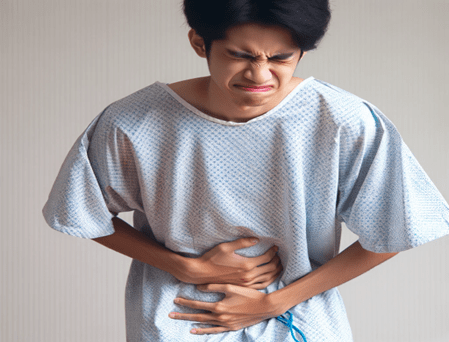Are you experiencing pain where appendix was removed years ago? In such situations, consulting a specialist for accurate diagnosis and effective solutions is crucial. Dr. Harsh Sheth, an esteemed bariatric & GI laparoscopic surgeon in Mumbai, is an expert in managing and treating such concerns. He is renowned for his expertise in gastrointestinal surgery in Mumbai.
Pain after an appendix removal is common immediately after the surgery. However, experiencing pain after appendix removal years later can be concerning and puzzling. A study found that children often experienced more chronic pain after an appendectomy.
Dr. Harsh Sheth, a competent GI laparoscopic and bariatric surgeon in Mumbai, often encounters patients with such concerns. While many factors can contribute to this delayed pain, understanding its root causes is crucial for proper management and relief.
Stay tuned to know the possible reasons and treatments for this discomfort.
First, let’s understand the,
Causes of Pain Where Appendix Was Removed Years Ago
There are several potential sources of pain years after appendix removal:
Adhesions:
The surgery can lead to scar tissue that binds organs, causing discomfort. A study revealed that the type of surgery might also influence the onset of chronic post-surgical pain.
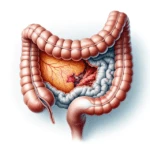
Hernia:
Irritation or Inflammation:
Nearby organs or tissues can become irritated or inflamed. This may cause pain near the appendix removal site.
Residual appendiceal stump:
Sometimes, a tiny part of the appendix remains. It can become inflamed and cause pain.
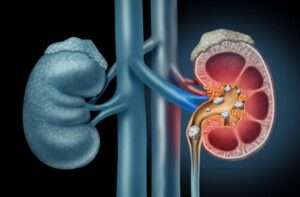
Unrelated Conditions:
Conditions like kidney stones, UTIs, or gastrointestinal disorders can result in pain. It may seem related to the appendix site.
Is post-appendectomy pain just a minor hiccup or something to worry about? Discover the real implications next.
How Serious Is Pain Post-Appendectomy?
According to Dr. Harsh Sheth, pain right after an appendectomy is expected as the body heals. However, if pain persists or returns later, it could range from benign to severe. Common causes like scar tissue might just be uncomfortable. But issues like hernias or infections need attention. If you feel persistent or severe pain after surgery, always consult a doctor. They can identify the root cause and guide you on the next steps.
Your health and comfort are paramount. So, never hesitate to seek professional advice.
So, let’s know,
When to See a Doctor?
If you have undergone an appendectomy and still feel pain, knowing when to seek medical attention is vital. Here are key signs that you should reach out to a professional:
Persistent Pain:
- Fever
If your pain lingers or becomes worse after a few days, see a doctor. - Fever or Chills:
These may indicate an infection. - Redness or Swelling:
If you notice these at the surgical site, it could suggest an infection or complication. - Digestive Concerns:
Issues like nausea, vomiting, or not passing gas or stools need attention. - Unusual Discharge:
A strange drainage or bad smell from the surgical site means you should see a doctor.


Are you dreaming of a healthier you?
Discover transformative options for weight loss surgery Mumbai right here. Book your consultation with Dr. Harsh Sheth, a leading weight loss surgeon in Mumbai, today!
Pain management can be simple if you have the right diagnosis and knowledge. Stay with us as we guide you through it.
Methods to Diagnose Pain Post-Appendectomy
- Physical Examination:
A doctor assesses the surgery site, looking for abnormal signs, complications, or discomfort. - Blood Tests:
It includes simple tests that detect infections, unusual markers in the blood, or inflammation in the body. - Ultrasound:
It uses sound waves to create pictures of the abdomen to spot any issues. - CT scan:
It provides a detailed picture of the abdomen. It assists doctors in identifying internal problems. - MRI:
It captures in-depth images of the abdomen’s soft tissues. It aids in spotting complications.
After identifying the cause of pain through diagnosis, it is crucial to explore the best treatment options.
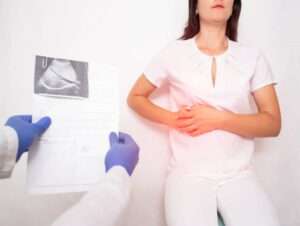
Treatment for Pain after Appendectomy
1. Pain Management:
Both OTC painkillers and prescribed medications can help manage the pain. Always follow the dosage recommendations.
2. Physical Therapy:
A trained therapist can guide you through specific exercises and techniques to enhance movement and reduce scar tissue.
3. Surgery:
Complications like hernias or strong adhesions might call for surgery. Always consult a surgeon for a detailed evaluation before deciding.
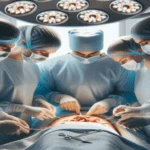
If an infection is causing the pain, antibiotics can be beneficial. Remember to complete the entire course, even if you feel better.
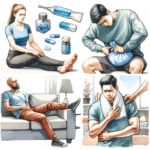
A warm compress can help ease pain and decrease swelling. It is an effective home remedy.
If stomach issues bother you, consider tweaking your diet. Cutting out some foods or increasing fibre intake can help.
It is crucial to work closely with a specialist like Dr. Harsh Sheth. They can advise you on the best treatment strategy. While home remedies can be helpful, always know when to seek professional medical care.
Now, let’s look,

What Do Medical Experts Say About Long-Term Pain in Appendix Area Years After Appendectomy?
Many patients recover from an appendectomy without lasting pain. However, some do experience discomfort long after the procedure. Here’s what medical experts highlight:
- Scar Tissue:
After surgery, scar tissue or adhesions can develop. These can pull on nearby tissues, causing pain. - Nerve Damage:
Sometimes, the surgery might injure or trap nerves, leading to ongoing pain. - Residual Infection:
If the appendix ruptures before removal or has an abscess, lingering infection or inflammation could be the source of pain. - Other Causes:
Pain might not always link to the appendectomy. Issues like Irritable Bowel Syndrome or kidney stones can cause similar pain sensations. - Psychological Factors:
Anxiety and other psychological conditions can amplify pain perception after surgery. Experts stress the need for a comprehensive diagnosis for patients with pain after an appendectomy. This helps identify the actual cause and tailor the right treatment.
Expert Tips on Managing and Preventing Post-Appendectomy Pain
Following are some tips to manage and prevent post-appendectomy pain:
- Follow Post-Operative Instructions:
Adhering to the doctor’s recommendations post-surgery is essential. - Regular Check-ups:
Periodic consultations can help in the early detection of complications. - Pain Management:
Over-the-counter or prescribed medications can help. Always use as directed. - Physical Therapy:
Targeted exercises might reduce the risk of adhesions and improve abdominal muscle strength. - Stay Active:
Gentle movements and walks can speed up recovery and reduce the risk of complications.
Remember, while these are expert opinions, always consult your healthcare provider regarding any concerns or symptoms.
Conclusion
Dr. Harsh Sheth emphasizes the importance of consulting a healthcare professional in such situations. Proactively understanding and addressing any discomfort ensures optimal health and peace of mind. Always prioritize your well-being.

